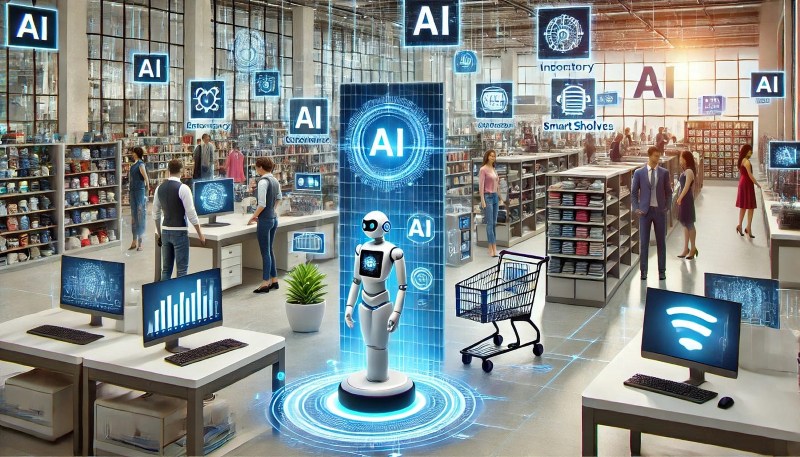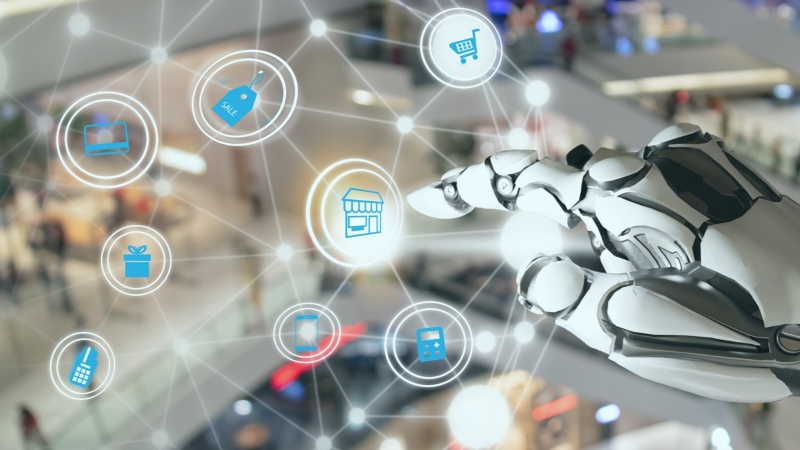The retail industry is undergoing a seismic shift as artificial intelligence (AI) is changing the way businesses operate and interact with customers. From personalized shopping experiences to streamlined supply chain operations, AI is transforming how retailers deliver value. This transformation is particularly noticeable with the integration of AI in FinTech, Cloud Hosting, Digital Banking, and E-Commerce Platforms. Together, these technologies are creating a more seamless, efficient, and customer-centric retail environment.
The Role of AI in Personalizing the Retail Experience
Personalization has become a critical differentiator in the retail sector. AI helps businesses provide customers with tailored experiences, driving engagement, satisfaction, and ultimately, sales. AI’s ability to analyze vast amounts of data quickly and provide personalized recommendations is changing the customer journey in remarkable ways.

AI-Powered Recommendation Engines
AI recommendation engines are now integral to most e-commerce platforms. By analyzing a customer’s browsing history, past purchases, and behavioral patterns, AI systems can predict what products a shopper might be interested in. This enhances the shopping experience, encouraging customers to explore more products, ultimately leading to higher conversion rates. Retailers like Amazon and Netflix have pioneered this approach, and it is now being adopted across smaller platforms as well.
AI-based recommendation engines are powered by machine learning algorithms that continuously improve based on customer data. Whether on websites, apps, or other retail platforms, AI recommendations appear as personalized suggestions, which customers often perceive as relevant and helpful. This seamless integration boosts sales and ensures that consumers have a more engaging shopping experience.
Dynamic Content Adaptation and Marketing
AI allows e-commerce platforms to modify content in real-time based on user behavior. If a customer has been looking at certain types of products, the site can dynamically adjust to show more relevant options. This real-time adjustment helps create a personalized environment that keeps users engaged, thus improving the chances of conversion.
Marketing campaigns benefit significantly from AI-powered analytics as well. AI helps businesses monitor user interactions with ads and products, offering real-time insights into which products are receiving attention and which ones are not. This enables retailers to adapt their marketing strategies quickly and effectively, ensuring that campaigns remain targeted and relevant.
Optimizing Retail Operations with AI
Beyond enhancing the customer experience, AI plays a significant role in improving retail operations. Efficient inventory management, supply chain optimization, and demand forecasting are just a few ways AI is revolutionizing the operational side of retail.

Demand Forecasting and Inventory Management
AI-driven predictive analytics are essential for effective inventory management. By analyzing historical data and identifying patterns in consumer behavior, AI systems can predict product demand more accurately. This reduces the risk of stockouts or overstocking, both of which can result in lost sales or excessive inventory costs.
AI systems can also integrate with cloud hosting platforms to track inventory in real-time. This ensures that retailers always know exactly what’s in stock, what’s selling well, and what’s not. AI-driven tools can send automated alerts when stock levels are low, allowing businesses to reorder products efficiently.
Supply Chain Optimization
AI helps retailers optimize their supply chains by forecasting potential disruptions and ensuring a smooth flow of goods. By analyzing data on shipping times, supplier reliability, and even external factors like weather patterns, AI provides critical insights that help retailers avoid delays and mitigate risks. This results in faster deliveries and reduced operational costs.
Automated Reordering
AI can automate the reordering process by predicting when stock will run low based on customer demand and historical data. This eliminates the need for manual intervention and ensures that products are always available for customers, improving the overall shopping experience.
Revolutionizing In-Store Experiences
While online shopping continues to dominate, physical retail stores still play a significant role in the overall retail landscape. AI is helping brick-and-mortar stores create more efficient and engaging shopping environments.

Smart Shelves and Product Tracking
AI-powered smart shelves are a game-changer for physical stores. These shelves use sensors to track product levels in real-time, ensuring that items are always stocked. In addition, they can automatically alert staff when a product is running low, ensuring that inventory levels are consistently maintained.
Smart shelves also help improve the in-store experience by offering data on customer interactions with products. Retailers can use this information to optimize store layouts and better position products that are in high demand.
Customer Behavior Analytics
AI can track foot traffic, analyze how customers move around the store, and identify which products are getting the most attention. By analyzing these behaviors, retailers can make data-driven decisions about store layouts, product placement, and promotions.
For instance, if customers are frequently stopping in front of a specific display but not making purchases, AI could suggest changes to the product positioning or even the type of items displayed. This ability to continuously adjust the in-store experience in real-time can lead to significant increases in sales.
Augmented Reality (AR) and AI
Retailers are also integrating AI with augmented reality (AR) to enhance the customer experience. For example, furniture retailers use AR apps powered by AI to show customers how a piece of furniture would look in their homes before purchasing. This blend of AI and AR creates an immersive experience that encourages customers to make purchases, knowing exactly how the product will fit into their lives.
AI and Emerging Technologies in Retail
AI is not just reshaping retail on its own; it is also working in harmony with other emerging technologies like FinTech, Cloud Hosting, Digital Banking, and E-Commerce Platforms to deliver more value to retailers and their customers.
Cloud Hosting: The Backbone of AI Integration
Cloud hosting has been critical in enabling AI in retail. It provides the infrastructure required to scale AI applications and ensures that retailers can access large datasets in real time. AI solutions, when paired with cloud hosting, offer the flexibility to adjust to changes in demand and help retailers respond quickly to market conditions.
Moreover, cloud hosting provides retailers with the ability to store vast amounts of data securely. As AI systems rely on data to learn and improve, the capacity for secure, scalable storage becomes crucial. Cloud hosting solutions also offer cost-effective scalability, ensuring that retailers only pay for the computing resources they use.
AI’s Role in FinTech and Digital Banking in Retail
FinTech and Digital Banking innovations are becoming increasingly integrated into the retail experience, and AI is playing a major role in their evolution. AI is used to detect fraud in real-time, offer personalized payment options, and streamline transactions, ensuring that customers have secure and seamless experiences.
For instance, AI can help prevent fraud by detecting unusual transaction patterns and flagging them immediately, offering enhanced security for both the retailer and the customer. AI-driven payment gateways are also becoming more common, enabling customers to pay with voice commands or even facial recognition, making the payment process faster and more convenient.
The integration of AI with Digital Banking systems also enables retailers to offer flexible payment options such as Buy Now, Pay Later (BNPL). AI can instantly assess a customer’s creditworthiness and provide them with instant access to financing, allowing retailers to capture sales that might otherwise be lost.
E-Commerce Platforms and AI Integration
AI is transforming e-commerce platforms, allowing retailers to optimize their websites and apps for a more personalized and efficient shopping experience. AI improves the accuracy of product search engines, predicts what customers might be interested in based on their behavior, and automates customer support with AI-powered chatbots.
Furthermore, AI tools can track customer behavior across e-commerce platforms, giving retailers invaluable insights into how customers interact with their sites. This data can be used to enhance website navigation, optimize product placements, and personalize advertising campaigns. AI also enables retailers to engage customers with tailored offers and promotions based on their past purchasing behavior.
The Future of AI in Retail
The future of AI in retail is promising, with continued advancements in machine learning, data analytics, and automation driving even greater changes. Retailers are likely to adopt even more AI-powered solutions in areas such as supply chain management, customer service, and predictive analytics.
Additionally, as AI continues to evolve, retailers will be able to offer even more personalized and efficient shopping experiences, combining the benefits of AI with emerging technologies like 5G, blockchain, and IoT.
Conclusion
AI is fundamentally reshaping the retail landscape. With the ability to personalize experiences, optimize operations, and integrate with emerging technologies like FinTech, Cloud Hosting, Digital Banking, and E-Commerce Platforms, AI is providing retailers with new tools to enhance both customer satisfaction and operational efficiency.
As AI continues to evolve, its impact on the retail industry will only grow, enabling businesses to meet the ever-changing demands of today’s consumers. For retailers looking to remain competitive, investing in AI-driven solutions is no longer a luxury—it’s a necessity.
While challenges like data privacy, ethical considerations, and cost barriers exist, the benefits of AI far outweigh the drawbacks. Retailers who prioritize responsible AI adoption and focus on delivering customer-centric solutions will thrive in this transformative era.
The journey of AI in retail is just beginning, with endless possibilities for innovation, efficiency, and growth. Retailers who embrace this technology will not only meet consumer expectations but also set new benchmarks for the industry.






